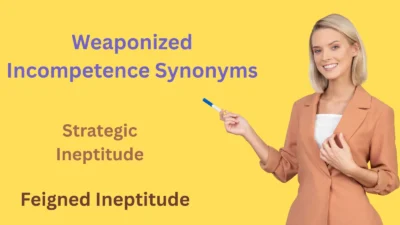As a Result Synonym is one of the most common connectors in English writing. It shows cause and effect — linking an action to its outcome. For instance, in the sentence “He studied hard; as a result, he passed the exam,” the phrase explains that the success happened because of his effort.
However, repeating as a result too often can make your writing sound repetitive or mechanical. Fortunately, English offers many synonyms and alternatives that express the same idea with different tones — from formal academic writing to conversational storytelling.
In this guide, we’ll explore synonyms of “as a result”, explain when each is most suitable, and show how to select the best one depending on tone, formality, and context.
1. Therefore
Meaning: Indicates a logical conclusion based on evidence or reasoning.
Example: He didn’t complete the form; therefore, his application was rejected.
When to Use: Ideal for formal or academic writing; emphasizes logic.
2. Consequently
Meaning: Highlights that one event happens as a consequence of another.
Example: She missed her flight; consequently, she arrived a day late.
When to Use: Suitable for professional, formal, or narrative contexts.
3. Thus
Meaning: Shows logical or factual continuation from a previous statement.
Example: The data was incomplete; thus, the results are inconclusive.
When to Use: Great for essays, research, or analytical writing.
4. Hence
Meaning: Signifies a direct result or reason.
Example: He was underqualified, hence the rejection.
When to Use: More formal or academic; elegant for concise explanations.
5. As a consequence
Meaning: Another way to say “because of that”; shows causality.
Example: As a consequence of his actions, he lost his position.
When to Use: Suitable for reports, essays, or polite explanations.
6. Accordingly
Meaning: Reflects a reaction or adjustment to a preceding event.
Example: The schedule was revised; accordingly, the meeting was postponed.
When to Use: Ideal for business or procedural writing.
7. For this reason
Meaning: Clarifies motivation or justification for something.
Example: For this reason, she decided to change her major.
When to Use: Good in both formal and conversational writing.
8. As such
Meaning: Suggests that something follows naturally from what came before.
Example: The plan was flawed; as such, it failed to deliver results.
When to Use: Works well in analytical or reflective writing.
9. In turn
Meaning: Describes a chain reaction or sequence of outcomes.
Example: Better training improved confidence, which in turn increased sales.
When to Use: Great for showing step-by-step cause and effect.
10. Because of this
Meaning: Directly attributes an outcome to a prior event.
Example: The storm delayed shipments; because of this, prices rose.
When to Use: Informal or conversational tone.
11. As a outcome (less common)
Meaning: Equivalent to “as a result,” though slightly awkward in use.
Example: As an outcome of his carelessness, the experiment failed.
When to Use: Rarely used; better to use “as a result” or “as a consequence.”
12. Due to this
Meaning: Indicates cause or reason.
Example: Due to this delay, the project was pushed back a week.
When to Use: Suitable for semi-formal or business contexts.
13. Owing to this
Meaning: Similar to “because of this,” but slightly more formal.
Example: Owing to this issue, the meeting was rescheduled.
When to Use: Formal writing, especially in reports or statements.
14. That’s why
Meaning: Expresses direct cause in casual conversation.
Example: I was sick; that’s why I didn’t attend class.
When to Use: Informal, spoken English or storytelling.
15. In consequence
Meaning: A formal phrase for “as a result.”
Example: He broke the rules; in consequence, he was suspended.
When to Use: Literary or historical writing; elegant but old-fashioned.
16. Because of that
Meaning: Simplifies causal connection in plain English.
Example: She forgot her umbrella; because of that, she got drenched.
When to Use: Everyday speech and simple writing.
17. Thereby
Meaning: Shows that an action produces a specific result.
Example: He improved his communication, thereby strengthening the team.
When to Use: Formal or academic writing; concise and polished.
18. From this
Meaning: Suggests a conclusion drawn from previous facts.
Example: From this, we can infer that the method was effective.
When to Use: Works best in analytical or explanatory contexts.
19. For that reason
Meaning: Explains cause in a neutral tone.
Example: For that reason, they decided to postpone the trip.
When to Use: Good in both formal and informal writing.
20. Following this
Meaning: Refers to something that happened immediately afterward.
Example: The announcement caused confusion; following this, a meeting was held.
When to Use: Best for chronological or procedural writing.
21. As a effect
Meaning: A slightly awkward version of “as a result.”
Example: As an effect of the reforms, inflation dropped.
When to Use: Use rarely; “as a result” or “consequently” is better.
22. Afterward
Meaning: Describes a sequence following an event.
Example: He apologized afterward.
When to Use: Neutral and temporal; less about causality, more about sequence.
23. As a direct consequence
Meaning: Emphasizes a strong, immediate cause-and-effect relationship.
Example: As a direct consequence of the error, the system crashed.
When to Use: Technical or analytical writing where precision matters.
24. Thusly
Meaning: Humorous or archaic form of “thus.”
Example: He completed the test, thus proving his skill.
When to Use: Rare; mostly for stylistic or ironic effect.
25. As an effect of
Meaning: Indicates that something resulted because of another event.
Example: As an effect of poor maintenance, the bridge collapsed.
When to Use: Academic or technical contexts; emphasizes outcome.
26. Then
Meaning: Implies a logical or temporal outcome.
Example: If you save regularly, then you’ll have enough for retirement.
When to Use: Useful in conditional or instructional sentences.
27. As follows
Meaning: Introduces results, steps, or conclusions.
Example: The findings are as follows: A, B, and C.
When to Use: Formal, explanatory, or report writing.
28. Thereafter
Meaning: Refers to events that happen after something else.
Example: He moved to Canada and lived there thereafter.
When to Use: Formal writing to indicate a time-based consequence.
29. On that account
Meaning: Indicates cause or justification.
Example: She was exhausted; on that account, she went home early.
When to Use: Formal and slightly old-fashioned.
30. For this cause
Meaning: Similar to “for this reason,” often used in religious or historical writing.
Example: For this cause, they united to defend their land.
When to Use: Archaic or rhetorical contexts; adds gravity or solemnity.
How to Choose the Right Synonym
- For formal writing: Use therefore, consequently, thus, hence, thereby, and accordingly.
- For academic essays: Prefer thus, therefore, as a consequence, or as a direct result.
- For storytelling or conversational tone: Use that’s why, because of this, in turn, or following this.
- For emotional or persuasive writing: For this reason, such writing is balanced and clear.
- To sound natural: Alternate between as a result, therefore, and hence to maintain flow without sounding repetitive.
Cultural and Emotional Nuances
- British English often favors hence and thereby in formal contexts.
- American English uses as a result and that’s why more often used in everyday writing.
- Some connectors, like in consequence and for this cause, sound traditional or literary — excellent for historical or reflective pieces.
Conclusion :
Understanding the meaning and usage of each As a Result synonym allows you to express cause and effect with precision and variety. Every alternative—from therefore and consequently to thus and that’s why—adds a distinct tone and level of formality to your writing.
By selecting the right As a Result synonym for your context, you can make your sentences sound more natural, avoid repetition, and enhance overall flow. Whether you’re writing essays, reports, or everyday communication, mastering these expressions helps your ideas connect smoothly and professionally.





